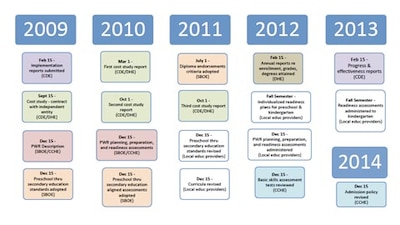Update 10:50 a.m. April 16 – The House voted 62-0 Friday to pass House Bill 10-1013, a measure that would extend some of the deadlines in the 2008 Colorado Achievement Plan for Kids education reform plan. The bill now goes to the Senate.
Text of Thursday story follows
An amendment added Thursday to an otherwise routine measure, House Bill 10-1013, could extend the implementation timeline for the Colorado Achievement Plan for Kids.

Under the terms of the CAP4K law, the State Board of Education has a Dec. 15 deadline to adopt a new state testing system. (The state Department of Education has been working for months doing research and gathering public comment on testing.)
But, the state’s tight financial situation, uncertainties about future federal testing requirements and grant opportunities and the possibility of multi-state testing systems have made that deadline unrealistic, and CDE is asking the legislature to ease it.
Education Commissioner Dwight Jones and other CDE officials repeatedly referred to uncertainties about testing issues during this month’s State Board of Education meeting, held Wednesday and Thursday.
The CAP4K law, passed in 2008, proposes a broad restructuring of the state’s education system, including descriptions of school and postsecondary and workforce readiness, new content standards, a new state testing system, alignment of local school curricula with the new standards, new types of high school diplomas and alignment of college admissions requirements with the new K-12 system. The original CAP4K schedule stretched into 2014. (The graphic above illustrates the complexity of that schedule.)
The amendment added during preliminary floor consideration Thursday says the board shall adopt a testing system by Dec. 15 – “or as soon thereafter as fiscally practicable.” The same language would apply to board adoption of a postsecondary and workforce readiness assessment.
Because of the law’s complex, interlocking set of deadlines, several other tasks would be affected by extension of the test deadline. Here’s a rundown of the other new deadlines:
- Specially endorsed diplomas would be adopted as soon as fiscally practicable after July 1, 2011.
- School district use of individual preschool readiness plans would be delayed to fall 2013 from fall 2012.
- A requirement that high school students successfully complete a postsecondary and workforce readiness program would be delayed to December 2013 from December 2012.
- The deadline for a cost study of new assessments would be delayed a year, from Oct. 1, 2010 to the same date in 2011. (The first of three CAP4K cost estimates was released this week; see this story. Rough estimates of the cost of a new testing system have ranged up to $80 million.)
- And, the CAP4K requirement that school districts align their graduation requirements to the new state system would kick in with the beginning of 2012-13 school year.
The CAP4K law also created a series of subsequent reviews and updates of standards, testing and other provisions. The start of that six-year cycle would be set back two years by the proposed changes.
The amended bill also would give the board a Dec. 15, 2011, deadline to create a set of high school graduation guidelines for consideration by local school districts. (A 2007 law set a 2009 deadline for that task, which wasn’t met.)
The state board Thursday approved the final regulations for 2009’s major education reform, Senate Bill 10-163. That law creates a new system for accrediting school district and for state assistance and intervention with struggling districts.
Do your homework
- House journal containing full CAP4K; see Amendment 3 starting on page 1237
- CDE information on CAP4K
- CDE information of Senate Bill 09-163
Conferees agree quickly on school finance
A six-member conference committee Thursday gave quick agreement to a proposed amendment that would resolve House-Senate differences in House Bill 10-1369, the 2010-11 school finance bill.
A main point of disagreement was how to handle budget cuts for seven districts that receive little or no state aid. The proposed compromise, which still has to be approved by both houses, basically would require those districts to take their hits through state categorical grants rather than having to reduce locally approved property taxes.
Senate Ed passes charter collaboration bill
The Senate Education Committee Thursday voted 6-2 to advance Senate Bill 10-161, a proposal by Sen. Keith King, R-Colorado Springs, that would allow charter schools to form collaborative groups to share services and also allow such groups to apply for various grants.
Vociferous opposition was voiced by Sen. Evie Hudak, D-Westminster, who warned that the bill would undermine the relationship between charters and their authorizing districts, she was able to persuade only one other Democrat, Sen. Rollie Heath of Boulder, to vote no.
Use the Education Bill Tracker for links to bill texts and status information
